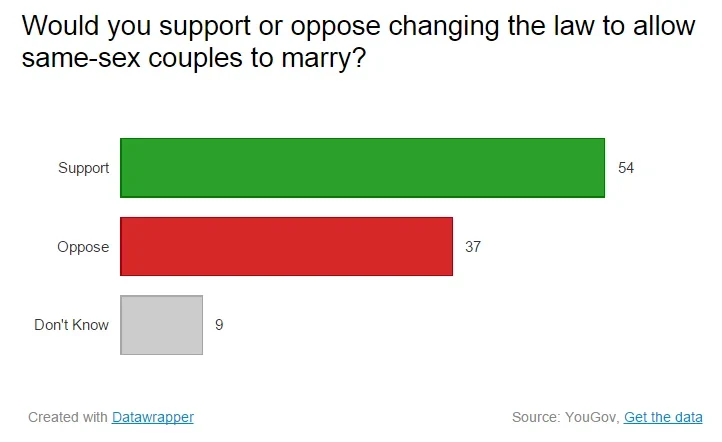YouGov President, Peter Kellner, latest commentary on how most voters back a change in the law
The passions of grass-roots Tories who are bitterly opposed to same-sex marriage are not shared by the wider electorate. Most voters back a change in the law – and very few opponents are willing to switch their votes because of this issue.
Want to receive Peter Kellner's commentaries by email? Subscribe here
Overall, YouGov’s latest poll for the Sunday Times finds that 54% of Britons support ‘changing the law to allow same-sex couples to marry’. Conservative supporters are evenly divided: 45% in favour, 48% oppose.

However, as MPs gather to debate the bill on same-sex marriage, perhaps the more significant figure is that only 7% include it among the top issue that will determine their vote. We offered people a list of 15 topics and asked them to pick up to four. Same-sex marriage comes twelfth. And those who DO include it divide 58-42 in being more likely to support a party that backs a change in the law.
So, among the public as a whole, 4% are pro-same-sex marriage AND say this is a vote-deciding issue, while 3% are in the opposite camp. Among those who voted Conservative in 2010, just 6% say this is a vote-deciding issue, and they divide 3-1 against same-sex marriage. So even there, the net effect is tiny.
And there are three reasons why even this net effect could disappear. First, even for this tiny number, the issue is just one of their top issues: at the end of an election campaign it might be trumped by other matters, or wider judgements about the characters of the parties and their leaders.
Second, there may well be others who were, and are, put off the Tories by their reluctance to embrace fully the principle of equality for gay and lesbian voters. And not just on gay marriage. There is a huge generation gap. Under 40s back gay marriage by more than three-to-one; voters over 60 oppose it by more than two-to-one. Most Tory activists are over 60, so on this issue they generally reflect the views, if not the passion, of their age group; but as a result they reinforce the impression among younger voters that much of the Tory is out of touch with 21st century Britain.
Third, and this is potentially the biggest threat to the Tories of all, the dispute reinforces the perception that the party is split. As with Europe, the impression is growing that David Cameron cannot keep the Tories together. The figures for the Conservatives are alarming: just 10% say it is united, while 73% say divided. This is not quite the worst that we have found, but it is reminiscent of the results that Gallup used to find in the mid-90s, during John Major’s darkest days.
To be sure, party divisions can work to a leader’s advantage. Labour was seen as horribly divided in the mid-1980s when the party’s far left engaged in trench warfare with its leader, Neil Kinnock. But when Kinnock stood his ground, fought back and won, his rating soared. It’s not so much the fact of the divisions over Europe and gay marriage that is damaging David Cameron but his seeming inability to defeat his Tory critics.
Meanwhile, on the specific issue that MPs are debating today, a 64-18% majority back the idea of allowing straight couples to enter into civil partnerships. However, it is one thing to make this change alongside giving gay couples the right to marry; it is quite another to employ an extension of civil partnerships as a device to delay gay marriage.
The Prime Minister, then, needs to win the day, and be seen to secure a victory based on deeply-held principles. By 59-25%, voters think he is supporting gay marriage for political reasons, rather than because he thinks it is the right thing to do. Tories divide evenly.
As a result, Cameron is in the worst possible place, being thought to fight a battle that few people think matters that much, for reasons that few people respect, and reinforcing his party’s reputation for division. These things are damaging his political prospects far more than his backing for a reasonably popular reform is boosting it.
See the full YouGov / Sunday Times survey results here
Want to receive Peter Kellner's commentaries by email? Subscribe here









